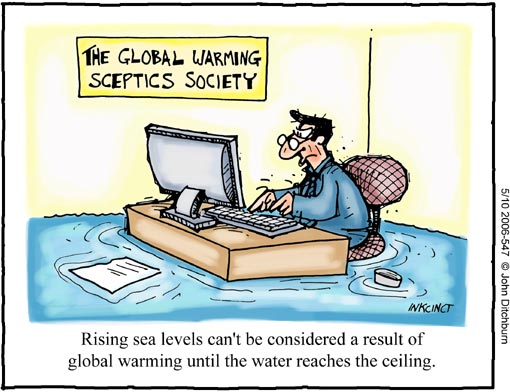 Meanwhile, beyond the SOPA blackout/back-peddle, and the nasty, bitch-slapping noise in South Carolina from GOP presidential nit-twits vying for richest asshole, there’s the non-stop horror of climate change.
Meanwhile, beyond the SOPA blackout/back-peddle, and the nasty, bitch-slapping noise in South Carolina from GOP presidential nit-twits vying for richest asshole, there’s the non-stop horror of climate change.
Climate what?
Last year, despite all kinds of horrible weather/climate shit, the news media has way-down-played climate change as anything more than a storm in passing — coverage for the common folk has just “fell off the map.”
(Illustration found here).
Up here along California’s northern coast this early Thursday rain is beating down, bolstered by a pretty-good wind — most likely an off-shoot from that big storm blasting the northwest (via Wunderblog): Field reports late Tuesday already indicated lots of natural and human triggered slides ranging from about 1 to 3 feet deep. Avalanche warnings already in effect for high danger…and with warming…further winds and additional heavy to very heavy snow…some quite dense…avalanche activity should become larger and more severe on Wednesday.
And what about that white stuff in Algeria, as …an unusual sight in the North African country, with scenes of palm trees surrounded by snow.
What, me worry?
You betcha.
One terrible aspect with the science on climate change is the re-occurring situation of shit being worse than originally proposed, as this little snippet from two years ago: We now know that, without effective action, climate change is going to be larger and more difficult to deal with than we thought.
And now, a new one, bringing extreme weather events into focus with climate and the speed of change, all done by math nerds.
From PhysOrg.com (h/t The Oil Drum):
Swiss mathematicians have shown that the risk of extreme climate events is largely underestimated.
They are developing a model for better understanding the impact of climate change.
…
For several years now, the scientists have noted that the increase in extreme events associated with climate change appears to be having much more of an impact on society than the increase in mean temperatures.
Natural disasters are accompanied by a significant human and economic cost.
In the case of exceptional heat waves, the mathematicians found that, based on global warming predictions, the probability of an event at least as severe as the 2003 heat wave will be six times greater in 2050 than it was in 2003.
This doesn’t seem to matter, however, if the MSM keeps pushing climate change away from A1 and onto the society pages without much ado, leaving people to fend for their mental selves — a horror story in itself.
The standard thought from the standard brain: ‘Somebody will figure out something, they always do.’
This line I’ve heard from countless folks, some more intelligent than others, but all have some kind of gray matter stored in their skull caps.
Since climate change is such a huge, way-out-there subject, a thing one “believes” (like it’s a religion or something), and not like a ball-bat up-side the head, people tend to skip away from really getting down and dirty with our one and only environment.
People seem to have a need to feel better than the reality — one has to have hope in order to work through tomorrow, right?
In view of this, a lot of problems that don’t literally face us each minute/hour/day are pushed aside and placed in a giant petri dish called the “optimism bias” — also known as the “positivity” illusion.
A paradox of that ain’t gonna happen to me.
From a discussion at CNN Health:
“It is a natural human inclination to see our situation and our future through rose-colored glasses,” says David Ropeik, author of “How Risky Is It, Really?: Why Our Fears Don’t Always Match the Facts.”
“We tend to see our prospects as being far better than they may actually be — and particularly when compared to the next guy.
This optimism lets us deal with hardship and take chances in life.”
…
Most people are mildly optimistic and that’s a good thing, observes Dr. Tali Sharot, author of “The Optimism Bias: A Tour of the Irrationally Positive Mind.”
“The 20 percent or so of people who do not have an optimism bias are clinically depressed.
In fact, when things go really bad, people become more optimistic, not less, because that’s when we need it most.”
According to Sharot, there is even more reason to celebrate our inclination toward hope.
“Optimism is better for your mental health – it eases your mind and actually lowers your stress.”
…
At the end of the day, “the bias toward optimism is helping you cope to some degree, but it can also be deceiving you into ignoring a danger,†notes Ropeik.
“To the extent we are less worried about something than we should be, that clearly raises our risk.
If optimism bias is letting us deny that our stressed lives are bad for our health, that harm far outweighs the measure of relief optimism can bring.
“Two things to keep in mind: you want to be aware of the risk and you want to be clear about the psychology behind the way you read and assess the risk.
When you know both, you will be better equipped to take action.”
Unless it’s done too late — optimism without reality won’t travel far.